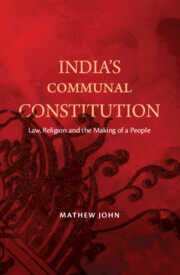2 - The Communal Image of the People in India's Personal Laws
Published online by Cambridge University Press: 05 August 2023
Summary
This chapter pulls together an account of personal laws across colonial and contemporary India to illustrate the manner in which the identity of the Indian people is constitutionally cast in communal terms. Personal laws, as they developed in colonial India, have clearly been carried over into the legal scheme of contemporary India. However, personal laws were designed to be a receding part of the Constitution of independent India. Article 44 is a directive principle that obliged the Indian state to work towards a uniform civil code, presumably by doing away with personal laws. Even so, decades after the adoption of the Constitution, the inability to secure a uniform civil code has produced much discussion, either pronouncing failure of this normative objective1 or justifying the continuation of personal laws as consistent with the Indian constitutional order. Bracketing a full-blooded consideration of these normative points of view, this chapter draws on these alternative positions to disclose and make apparent contrasting forms of identifying the Indian people.
Of the various ways in which the Indian people are identified in discussions on personal law, this chapter demonstrates the overlapping salience of a communally inflected conception of the Indian people as foregrounded in Chapter 1. That is, extending the discussion on colonial toleration, this chapter demonstrates constitutional organisation and practice of personal law that actively draws on and entrenches the very same religiously organised and communal vision of the Indian people.
The Background: Peoples and Their Laws
The historical roots that bind personal laws to contemporary Indian law have been previously traced to colonial toleration. The commitment to tolerate constituted personal laws as objects of forbearance but through a peculiar legal reconstruction and reduction of local religious and cultural practices. This reduction of religious traditions to axiomatically applicable propositions identified as essential doctrines was outlined in Chapter 1. Additionally, a complement to this form of toleration was the manner in which personal laws were crafted as a self-conscious act of legal recovery that must now be briefly recounted.
Thus, drawing on the expertise of antiquarians, linguists, historians and Indologists, the toleration of personal laws was tied to its recovery and re-constitution by the East Indian Company after it took over the administration of Bengal following the Battle of Plassey in 1757.
- Type
- Chapter
- Information
- India's Communal ConstitutionLaw, Religion, and the Making of a People, pp. 46 - 70Publisher: Cambridge University PressPrint publication year: 2024

